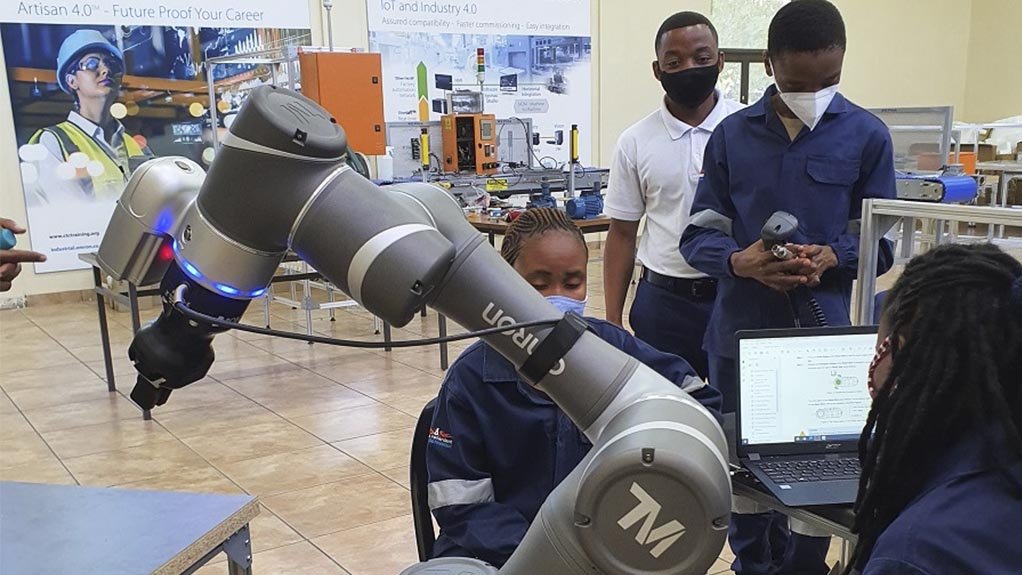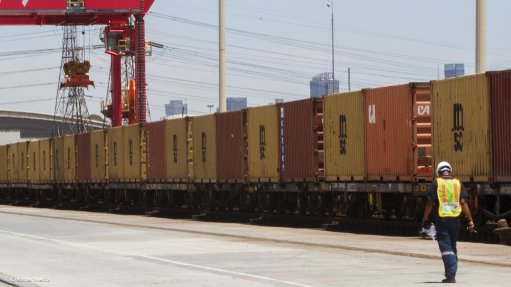Industry 4.0 training key to ensuring South Africa is not left behind




ADESH NATHALAL It is pointless investing in new technology if employees do not know how to use it
ROBO LEARNING CTC’s Artisan 4.0 course features a robotics component that aims to teach learners how to program autonomous vehicles and machines
To fully realise the potential of Industry 4.0 and remain relevant as the way of conducting business evolves, South African organisations should consider making strategic investments in infrastructure and technology as soon as possible. However, these investments will be rendered ineffective if organisations do not simultaneously ensure that the necessary skills development takes place in parallel to support the investments.
The Covid-19 pandemic has forced local organisations in both the public and private sectors to embrace digital transformation and the digitalisation of internal processes. Those that have not done so yet are in imminent danger of falling by the wayside, indicating that the move towards Industry 4.0 technologies and methodologies is no longer optional if an organisation wishes to survive amid the “new normal”.
Analytics software solutions provider SAS South Africa education manager Adesh Nathalal believes that infrastructure and training investments should be made in areas such as artificial intelligence (AI), machine learning (ML), the cloud and the Internet of Things (IoT) – all of which are critical areas that must be considered if a business is to gain value from Industry 4.0.
“Africa was left behind during the previous three industrial revolutions. Therefore, to ensure that the same does not happen with Industry 4.0, both the private and public sectors must drive this revolution in Africa,” Nathalal says.
A key concern when implementing Industry 4.0 technologies in South Africa – and in Africa in general – is the employment factor. It remains a significant challenge to implement a just transition to Industry 4.0 technologies and simultaneously retain jobs. Investments in AI and ML technologies might result in a reduced need for human resources. Nonetheless, there is increased pressure to maintain pace with other developing and developed countries as they implement Industry 4.0 technologies.
A reduced human resources complement translates into significant savings for organisations in terms of labour costs, as well as improved efficiencies, reductions in human error, improved health and safety performance, and better corporate governance, owing to more accurate reporting.
On the other hand, a reduced human resources component has negative implications for the unskilled and low-skilled job market. Notwithstanding, demand for Industry 4.0 skills is high, particularly where technological skills are paired with specialist industry knowledge and experience.
Pan-African technology provider Dwyka Mining Services CEO Jamie van Schoor tells Engineering News & Mining Weekly that specialised mining technologists, for example, are in extremely high demand as mining companies gravitate ever more towards digitalisation, automation and remote mining technologies.
Talent War
Dwyka Mining Services is currently exploring bespoke mentorship programmes to train up mining technologists for clients to re-absorb talent – a framework which requires exposure to diverse applications, engineering expertise and in-depth knowledge of the mining industry, as well as high-end skills in information technology. Van Schoor says that such a combination is exceedingly rare, and that tertiary education institutions should endeavour to fill this gap in the skills market in expectation of even higher demand in future.
“Whichever companies are most bullish about adopting new technologies are going to grab the best talent,” Van Schoor says, noting that the sooner companies invest in technology, the more likely they are to thrive in future – which is all the more pressing, given that South Africa is normally lagging up to two years behind developed countries in terms of technology adoption.
“This kind of skills and technological evolution requires a balancing act from business leaders – between maintaining technology and infrastructure growth and continuing with job creation initiatives to grow business and the economy,” Nathalal notes.
He says that much of the focus over the past year has been on closing the digital divide – regardless of the industry sector in which businesses operate.
Nathalal notes, however, that an organisation need not be at the forefront of AI and ML implementation to remain relevant and competitive, but should rather simply focus on ensuring that it invests in the basic data science skills needed for the implementation of these technologies.
He says that this lays the foundation for future growth, enabling such organisations to leverage Industry 4.0 innovations when they are implemented.
“If a business does not invest in these fundamental skills to adopt and leverage new and disruptive technologies today, it will become obsolete. Unfortunately, corporate South Africa is not paying sufficient attention to reskilling and upskilling for Industry 4.0,” he tells Engineering News & Mining Weekly.
While for many Covid-19 has acted as a catalyst towards digitalisation, many South African companies have chosen a “wait and see” mentality, unsure about how things will pan out over the coming months.
“This means that even though they have budgeted for training and skills development, they want to see how the vaccine roll-out will impact on the work environment. Only then will they resume training and skills development,” Nathalal avers, adding that a back-to-basics approach is essential for building the necessary skills to fully realise the potential of Industry 4.0.
“It is pointless investing in new technology if employees do not know how to use it. The technology cannot deliver a return on investment if people are not going to adopt it and leverage the new system effectively,” he explains.
Artisans, for example, are not trained to interact with Industry 4.0 technologies, which renders them underskilled in the rapidly evolving modern industry.
“For people to implement and maintain Industry 4.0 technologies, they need appropriate skills. The normal skills set of artisans doesn’t cater for this, and yet artisans are right there where the implementation is happening,” says industry education entity Colliery Training College (CTC) MD Johan Venter.
Nathalal believes that attention must be given to how to expand on the formal education system to include the development of skills that are essential for Industry 4.0.
This must be done to ensure that new entrants into the job market will have a solid foundational tertiary education geared towards harnessing AI, ML, IoT and cloud technologies.
Examples of Industry 4.0 training in South Africa
Nathalal says that there are positive signs that the attitude in South Africa towards such training is improving. When South Africa went into lockdown last year, SAS made most of its training offerings available online and free to use for 30 days.
“The uptake in the Academy for Data Science and SAS Learning Subscription, for example, was phenomenal, pointing to significant interest from people wanting to reskill and upskill themselves to remain relevant,” he says.
Meanwhile, CTC has introduced the Artisan 4.0 training programme, which Venter says is focused on learning and working online.
Phase 1 of the programme, which is a free online module, was first made available to artisan learners in September last year. Phase 2, which is a paid module, has been available online since November.
Phase 3 comprises a ten-day workshop, hosted physically at CTC’s premises in eMalahleni, Mpumalanga, during which the practical aspects of artisan work in the context of the modern, digital world of work is practised.
The skills acquired during the Artisan 4.0 programme are useful for entry-level artisans who are vying for higher-level occupational categories.
“Digital sensors, devices and networks that talk to each other, and to human users, are becoming more pervasive,” Venter says, noting the rise of this technology in the mining industry, which is a result of various operational requirements in mining that benefit from such advancements.
The Artisan 4.0 course features a robotics component that aims to teach learners how to program autonomous vehicles and machines that can handle material safely in collaboration with people.
Venter says other notable course components are those that teach learners advanced programmable logic controller skills and human-machine interface technology skills.
“The standard curricula for electricians do not contain these learning outcomes. The same applies to electrohydraulics and electropneumatics artisan curricula. Nor are they taught about the smart sensors and safety devices that we see on factory and mining equipment,” he explains.
Occupational technical skills and safety training facility Murray & Roberts Training Academy (MRTA) has also invested in a series of additions and upgrades at its facility in Carletonville, Gauteng, to further ensure that learners are better prepared for the digitalised, mechanised and automated future of mining.
MRTA has adopted a blended learning approach – which incorporates computer-based e-learning, clicker-based training workshops, instructional videos, virtual reality simulations and interactive practical training on mock-ups. The course was recently enhanced by the introduction of a new paperless training management system, which provides ample platforms for theoretical, reflexive and practical training.
“MRTA’s blended learning approach, coupled with the embrace of Industry 4.0 technology, makes the training experience unique within the South African mining training space,” Murray & Roberts Cementation education, training and development executive Tony Pretorius told Engineering News & Mining Weekly in May.
The Road to Adoption
Van Schoor says that, to successfully roll out Industry 4.0 technologies across South African industry, sustainable, robust and reliable power – within the quality parameters that Industry 4.0 devices need and in the right location – is critical.
He notes that the advent of alternative and renewable-energy sources are elevating the need for quality-of-service analyses across mine sites and other industrial operations – to ensure that the hybrid supply of power can sustain the growing demand for data-hungry devices and growing datasets.
Connectivity is also key, as it forms the foundation of industrial control and automation. Connecting company assets to seamlessly communicate and share large datasets effortlessly can only be achieved by ensuring site-wide gigabit wireless coverage, which is required everywhere.
Collaboratively identifying and workshopping the removal of staff from hazardous locations is key to elevating safety for sustainable workforce buy-in and shareholder confidence.
Semi- and fully-autonomous applications are already replacing repetitive tasks and jobs, where “low skill, high exposure” situations are being re-engineered to offer a feasible win-win for all stakeholders. However, Van Schoor emphasises that this has to be done with full acknowledgment of legacy challenges for a thriving futureproof industrial sector.
Comments
Announcements
What's On
Subscribe to improve your user experience...
Option 1 (equivalent of R125 a month):
Receive a weekly copy of Creamer Media's Engineering News & Mining Weekly magazine
(print copy for those in South Africa and e-magazine for those outside of South Africa)
Receive daily email newsletters
Access to full search results
Access archive of magazine back copies
Access to Projects in Progress
Access to ONE Research Report of your choice in PDF format
Option 2 (equivalent of R375 a month):
All benefits from Option 1
PLUS
Access to Creamer Media's Research Channel Africa for ALL Research Reports, in PDF format, on various industrial and mining sectors
including Electricity; Water; Energy Transition; Hydrogen; Roads, Rail and Ports; Coal; Gold; Platinum; Battery Metals; etc.
Already a subscriber?
Forgotten your password?
Receive weekly copy of Creamer Media's Engineering News & Mining Weekly magazine (print copy for those in South Africa and e-magazine for those outside of South Africa)
➕
Recieve daily email newsletters
➕
Access to full search results
➕
Access archive of magazine back copies
➕
Access to Projects in Progress
➕
Access to ONE Research Report of your choice in PDF format
RESEARCH CHANNEL AFRICA
R4500 (equivalent of R375 a month)
SUBSCRIBEAll benefits from Option 1
➕
Access to Creamer Media's Research Channel Africa for ALL Research Reports on various industrial and mining sectors, in PDF format, including on:
Electricity
➕
Water
➕
Energy Transition
➕
Hydrogen
➕
Roads, Rail and Ports
➕
Coal
➕
Gold
➕
Platinum
➕
Battery Metals
➕
etc.
Receive all benefits from Option 1 or Option 2 delivered to numerous people at your company
➕
Multiple User names and Passwords for simultaneous log-ins
➕
Intranet integration access to all in your organisation





















